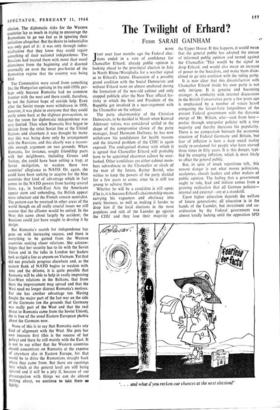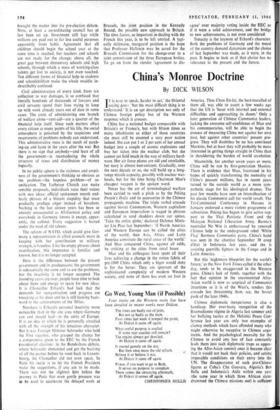The Twilight of Erhard?
From SARAH GAINHAM
BONN
JUST over four months ago the Federal elec- Pions ended in a vote of confidence for Chancellor Erhard; already public opinion is looking ahead to the provincial election in July in North Rhine/Westphalia for a weather signal as to Erhard's future. Discussion of a possible grand coalition with the Social Democrats and without Erhard went on almost unabated during the formation of the new-old cabinet and only stopped publicly after the New Year official fes- tivity at which the host and President of the Republic got involved in a near-argument with the Chancellor on the subject.
The party chairmanship of the Christian Democrats, to be decided in March when Konrad Adenauer retires, was considered settled in the shape of the compromise choice of the party manager, Josef Hermann Dufhues; he has now withdrawn his candidature for health reasons and the internal problem of the CDU is again exposed. The undisguised dismay with which it is agreed that Chancellor Erhard will probably have to be appointed chairman cannot be over- looked. Other candidates are either cabinet mem- bers subordinate to the Chancellor or rivals of the man of the future, Rainer Barzel, who wishes to keep the powers of the party divided for a few years to come, since he is still too young to achieve them.
Whether he will be a candidate is still open; if he is, it is because Erhard's chairmanship means carrying his vagueness and obstinacy into party business, as well as making it harder to drop him if the local elections in the most populous and rich of the Laender go against the CDU and they lose their majority in the Upper House. If this happens, it would mean that the general public has adopted the unease of informed public opinion and turned against the Chancellor. "This would be the signal to drop Erhard, and would also mean an increase of power to the Socialists, and make them disin- clined to go into coalition with the ruling party.
It is now clear that this dissatisfaction with Chancellor Erhard inside his own party is not only intrigue. It is genuine and becoming stronger. A similarity with internal discussions in the British Conservative party a few years ago is emphasised by a number of voices heard comparing the laissez-faire languidness of the present Federal government with the dynamic energy of Mr. Wilson, who—seen from here— pushes through unpopular policies with a tiny majority and thereby increases his popularity. There is no comparison between the economic situation of Federal Germany and Britain, but fear of inflation is here a deep social reality easily re-awakened for people who have starved three times in fifty years. It is this danger, typi- fied by creeping inflation, which is most likely to affect the general public.
But, in spite of much repetitious talk, this remote danger is not what moves politicians, academics, church leaders and other makers of public opinion. The feeling that a government ought to rule, lead and initiate comes from a growing realisation that all German policies— internal and external—are at a standstill.
Upon higher education depends the welfare of future generations; all education is in the hands of the Laender, but investment and co- ordination by the Federal government was almost totally lacking until the opposition SPD
. . and what d'you reckon our chances at the next election?'
brought the matter into the pre-election debate. Now, at least a co-ordinating council has at last been set up. Investment still lags while millions are paid out to far less useful purposes apparently from habit. Agreement that all children should begin the school year at the same time is reached, but teachers and schools are not ready for the change; above all, the great gap between elementary schools and high schools, through which a mass of working-class talents get lost to society, is not even touched. Ten different forms of financial help to students and schoolchildren make the whole muddle in- describably confused.
Civil administration of every kind, from tax collection to war damages, is so confused that literally hundreds of thousands of lawyers and civil servants spend their lives trying to keep up with work already years out of date in some cases. The costs of administering one branch of welfare alone—rent-aid—are a quarter of the financial help itself. Since such matters affect every citizen at many points of his life, the social atmosphere is poisoned by the suspicions and resentments of problems nobody can understand. This administrative mess is the result of patch- ing-up and haste in the years after the war. But there is no sign that anybody—and least of all the government—is reconsidering the whole structure of taxes and distribution of money logically.
In no public sphere is the staleness and empti- ness of the government's thinking so obvious as the problem—the hopeless problem—of re- unification. The Lutheran Church can make sensible proposals, individuals raise their voices with new ideas; official spokesmen mouth end- lessly phrases of a blatant stupidity that must gradually produce anger instead of boredom. Nothing in the last sixteen years has been so entirely unsuccessful as All-German policy and everybody in Germany knows it except, appar- ently, the cabinet. Every suggestion is buried -under the mud of old taboos.
The reform of NATO, which could give Ger- many a representation in allied councils more in keeping with her contribution to military strength, is hopeless. Like the empty phrases about reunification, this impotence is familiar and known, but it is no longer accepted.
Here is the difference between the present government and its predecessors; the government is substantially the same and so are the problems, but the inactivity is no longer accepted. The founding years are over, people have time to look about them and energy to spare for new ideas. It is Chancellor Erhard's bad luck that the demands for reorganisation and progress are knocking at his door and he is still looking back- ward to the achievements of the 'fifties.
Nowhere is Erharck personal inactivity more noticeable than in the one area where Germany can and should lead—in the unity of Europe. It is an idea to which he is personally attached with all the strength of his tenacious character. But it was Foreign Minister Schroeder who held the Five together, who grasped the chance for a compromise given to the EEC by the French presidential election : in the Bundeshaus debate, where Schroeder demanded and got the backing of all the parties before he went back to Luxem- bourg, the Chancellor did not even speak. In Paris his tactic is to let the French President make the suggestions, if any are to be made. There was not the slightest hint before the journey to Paris that even gentle pressure was to be used to accelerate the delayed work at
Brussels, the joint position in the Kennedy Round, the possible new approach to Britain. The time factor, so important in dealing with the French this year, is to be left untried. A typi- cally defensive, rearguard position is the hope that Professor Hallstein may be saved for the Brussels Commission for the change-over to a joint commission of the three European bodies. To go on from the slender 'agreement to dis-
agree' over majority voting inside the EEC as if it were a solid achievement, and the bridge to new achievements, is not even considered.
Tenacity is the keynote of Erhard's character. Both the problems of Germany and the mood of the country demand dynamism and the choice of last September was made, as it were, in the past. It begins to look as if that choice has no relevance to the present and the future.



































 Previous page
Previous page